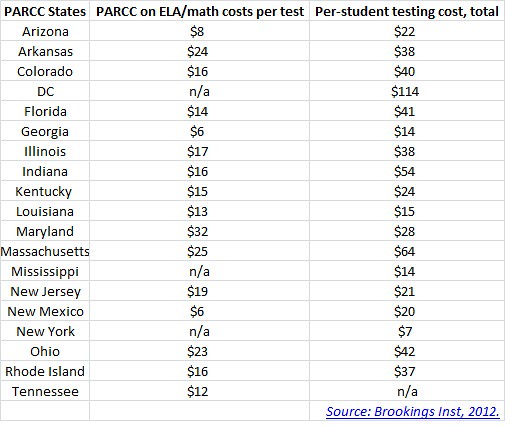It will take only three more states to withdraw from PARCC national Common Core tests to jeopardize the group’s $186 million federal grant.
On July 22, Georgia announced its withdrawal from the Partnership for Assessment of Readiness for College and Careers after PARCC released a new cost estimate of $29.50 per student. PARCC is one of two federally funded national testing consortia creating Common Core tests due in 2014-2015. It now has 19 member states, while Smarter Balanced, the other, has 24.
The Georgia Department of Education said in a statement it “will work with educators across the state to create standardized tests aligned to [the state’s] current academic standards in mathematics and English language arts for elementary, middle and high school students” and will also “seek opportunities to collaborate with other states.”
Alabama, Utah, Oklahoma, and Pennsylvania have also recently withdrawn from national Common Core tests. Florida’s Senate and House leaders have demanded their state do the same. Florida is the lead financial state for PARCC, and coordinated its federal grant.
Cost Comparisons
PARCC’s estimate put their test costs at nearly three times more than Georgia’ current testing costs. Georgia’s Criterion-Referenced Competency Test costs $8 to $9 per student, and assesses five subjects.
PARCC will measure two subjects: mathematics and English. In 2010, PARCC and Smarter Balanced compiled and released the testing costs of all their member states. A 2012 Brookings Institution report compiled their findings, among others, and indicates most PARCC states spend close to $29.50 per student on math and English language arts annual testing.
PARCC’s new cost estimate, also released July 22, stated at least half of PARCC states spend less than $29.50 on assessments per pupil. Spokesman Chad Colby said PARCC does not have the costs of individual state math and language art assessment sections for comparison.
Using the Brookings figures, the accompanying chart shows in the second column PARCC’s estimate of what each member state spends per test. The third column shows Brookings estimates for total per-pupil annual testing costs by state. States typically spend a third to a half of their testing budgets on math and English assessments. According to this data, Arizona, Florida, Georgia, Louisiana, Mississippi, New Mexico, New York, Tennessee, and possibly Kentucky’s current math and English tests are cheaper.

The current estimate updates PARCC’s initial, broader projections of “a low of $17-$18 per student per year to a high of $45-$50 per student per year.” In its grant application to the U.S. Department of Education, PARCC estimated middle-of-the-road costs at $32.58 per student per year, if states contract out to score some constructed response items and do the rest by artificial intelligence. Constructed-response items are open-ended test questions that currently only humans, not machines, can grade, making them more time-consuming and costly.
PARCC received its grant on the condition that at least 15 states participate in its testing work. With Georgia’s decision, PARCC now has 18 members.
Managing Editor Joy Pullmann contributed research for this article. Image by Lee Shaver.




